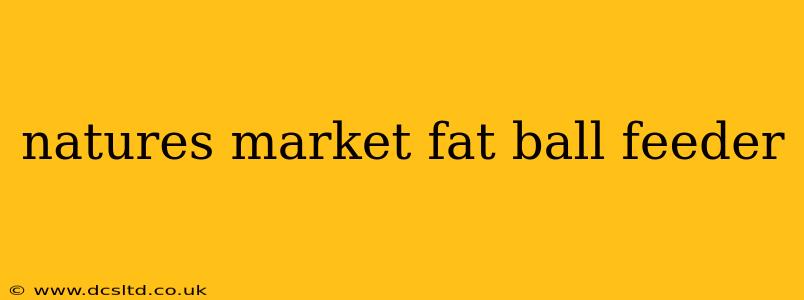Attract a vibrant array of garden birds with a Nature's Market fat ball feeder. These feeders offer a convenient and nutritious way to supplement your feathered friends' diets, especially during colder months when natural food sources are scarce. This comprehensive guide delves into everything you need to know about Nature's Market fat ball feeders, from their features and benefits to installation and maintenance.
What are the Benefits of Using a Nature's Market Fat Ball Feeder?
Nature's Market fat ball feeders provide several key advantages for both birds and bird enthusiasts:
- High-Energy Food Source: Fat balls are packed with calories, providing birds with the energy they need to survive harsh weather conditions. This is especially crucial during winter when finding natural food sources is more challenging.
- Convenient Feeding: These feeders offer a simple and efficient method for providing birds with a readily available food source. No messy scattering of seeds or complicated refilling processes are required.
- Attracts a Variety of Birds: Fat balls appeal to a wide range of bird species, enriching your garden's biodiversity. You're likely to see everything from robins and blue tits to nuthatches and woodpeckers.
- Weather Resistance: Many Nature's Market feeders are designed with weather-resistant materials, ensuring the fat balls stay protected from rain and snow.
- Easy to Clean: Maintaining hygiene is crucial for preventing the spread of disease among birds. Nature's Market feeders are typically designed for easy cleaning and maintenance.
What Types of Birds are Attracted to Nature's Market Fat Ball Feeders?
A wide variety of birds are attracted to the high-energy content of fat balls. The specific species you attract will depend on your location and the surrounding habitat. Common visitors include:
- Blue Tits: These small, brightly colored birds are frequent visitors to fat ball feeders.
- Great Tits: Similar to blue tits, but larger.
- Nuthatches: These acrobatic birds often cling to the feeder upside down.
- Robins: While they also forage on the ground, robins will readily visit fat ball feeders.
- Woodpeckers: Certain woodpecker species will visit feeders for a supplementary food source.
- Starlings: These common birds are also attracted to the high-energy content of fat balls.
How Do I Clean a Nature's Market Fat Ball Feeder?
Regular cleaning is essential to prevent the spread of disease amongst your visiting birds. Follow these steps:
- Remove the old fat ball: Dispose of the used fat ball responsibly.
- Disassemble the feeder: Take apart the feeder as instructed by the manufacturer.
- Wash thoroughly: Use warm, soapy water to clean all parts of the feeder. Avoid harsh chemicals.
- Rinse completely: Ensure all traces of soap are removed.
- Dry thoroughly: Allow all parts to dry completely before reassembling and refilling.
- Regular Cleaning Schedule: Aim to clean your feeder at least once a month, or more frequently if it appears soiled.
Where is the Best Place to Put a Nature's Market Fat Ball Feeder?
Proper placement maximizes the feeder's effectiveness and protects the birds from predators:
- Secure Location: Choose a location where the feeder is securely attached and protected from strong winds.
- Shelter from the elements: Position the feeder in a sheltered spot, away from direct rain or harsh sunlight.
- Visibility and Access: Make sure the feeder is easily accessible to birds, but also relatively hidden from predators such as cats.
- Away from Windows: Place the feeder at least 3 feet away from windows to prevent collisions.
- Observe Bird Behavior: Once you've placed the feeder, watch the birds use it. Adjust its position if necessary based on their behavior.
What Type of Fat Balls Should I Use in a Nature's Market Fat Ball Feeder?
Using high-quality fat balls is crucial for providing birds with optimal nutrition. Look for fat balls that:
- Are made with natural ingredients: Avoid fat balls containing artificial colors, flavors, or preservatives.
- Contain a mix of seeds and nuts: This provides a more varied diet for the birds.
- Are free from pesticides and herbicides: This is vital for the birds' health.
- Are suitable for the species you want to attract: Different birds may prefer different types of fat balls.
This guide provides a comprehensive overview of Nature's Market fat ball feeders. By following these tips, you can effectively attract a variety of birds to your garden and provide them with a nutritious and reliable food source. Remember to always prioritize the birds' health and well-being.
